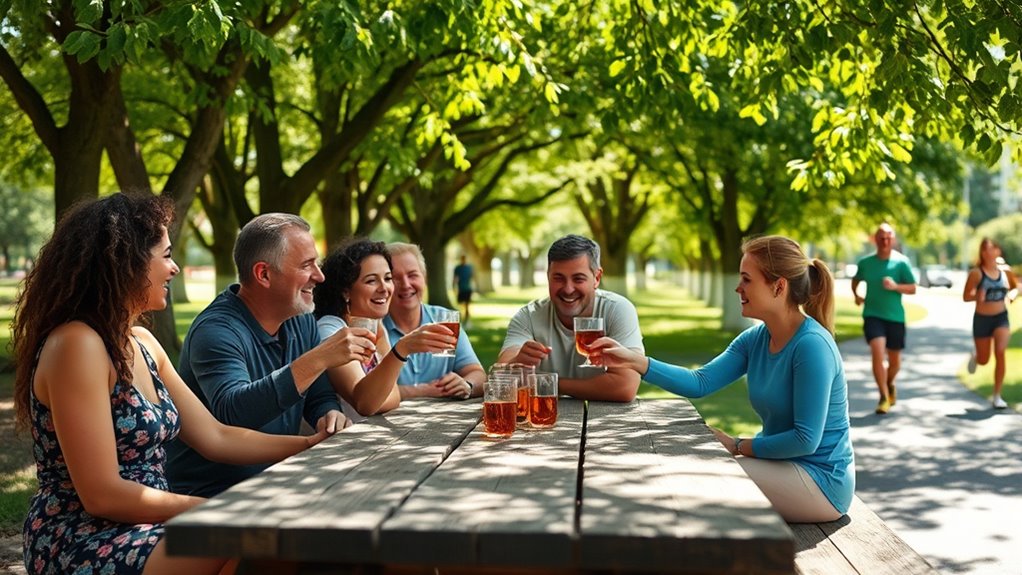Building strong social connections can provide health benefits that often surpass those from physical fitness alone. When you nurture genuine emotional bonds and engage with your community, you boost your mental and emotional resilience, reduce stress, and even strengthen your immune system. Friends and social support create a sense of belonging that fuels happiness and long-term well-being. If you want to discover how prioritizing social wellness can transform your health, keep exploring these essential connections.
Key Takeaways
- Strong social connections improve mental resilience and emotional stability, often more significantly than physical fitness alone.
- Genuine friendships provide emotional support, validation, and trust, essential for mental health and overall well-being.
- Social wellness reduces stress, loneliness, and depression, leading to better physical health outcomes beyond fitness routines.
- Meaningful relationships foster a sense of belonging and purpose, which are key to long-term happiness and fulfillment.
- Investing in friendships and community offers holistic health benefits that can surpass the gains from physical exercise alone.

Have you ever considered how your social connections impact your overall well-being? It’s easy to focus on physical health, like hitting the gym or eating right, but your social wellness plays a fundamental role that often goes unnoticed. When you nurture community support and develop genuine emotional connections, you’re investing in a foundation that sustains your mental and emotional health. These relationships act as a buffer against stress, providing comfort and reassurance during tough times. Feeling connected to others creates a sense of belonging, which is essential to feeling fulfilled and balanced.
Nurturing social connections strengthens mental health and provides essential support during tough times.
Community support isn’t just about having people around; it’s about quality, meaningful interactions that give you a sense of safety and understanding. When you participate in social activities, whether through friends, family, or community groups, you build a network that encourages your personal growth. Sharing your experiences and listening to others fosters emotional bonds that boost your resilience. These connections can motivate you to stay positive, even when life throws challenges your way. Knowing you’re not alone in your struggles reduces feelings of loneliness and increases your capacity to cope.
Developing emotional connections is equally important. When you truly open up to others, you experience a sense of validation and empathy that can’t be replicated through solitary pursuits. These bonds foster trust and understanding, which are essential to your mental health. Emotional support from friends or loved ones helps you process your feelings, manage anxiety, and navigate difficult decisions more effectively. It’s not just about talking; it’s about feeling heard and valued, which enhances your self-esteem and emotional stability. The depth of these relationships often acts as a catalyst for personal growth and happiness.
Social wellness also influences your physical health. Engaging regularly with others can lower blood pressure, reduce the risk of depression, and even boost your immune system. It’s a simple fact: the more connected you are, the healthier you tend to be. Unlike fitness routines that focus on the body, social wellness emphasizes the importance of mental and emotional balance. It reminds you that health isn’t solely about physical strength but also about nurturing your mind and spirit through authentic connections. Social connections are a vital component of overall health, illustrating the profound impact of community on well-being.
In essence, investing in social wellness means prioritizing community support and emotional connection. When you do, you create a supportive environment that nurtures your overall well-being. Friends and community are more than just social outlets—they’re indispensable to your resilience, happiness, and longevity. So, next time you’re tempted to skip social interactions, remember how much these relationships contribute to your health and happiness. They truly outrank fitness in many ways, offering a holistic boost that benefits every aspect of your life.
Frequently Asked Questions
How Do Friendships Impact Mental Health Long-Term?
Friendships play a crucial role in your long-term mental health by providing emotional intimacy and support. They help reduce social anxiety, making it easier to connect and share feelings. Over time, strong friendships boost your resilience, improve your mood, and lower stress levels. You benefit from a sense of belonging and trust, which are essential for mental well-being. Maintaining these relationships helps you navigate life’s challenges more confidently and with greater emotional stability.
Can Social Wellness Improve Physical Health Outcomes?
In the age of chivalry, social wellness definitely impacts your physical health. When you engage with your community and seek emotional support, you’re more likely to adopt healthy habits and stay motivated. Connecting with others reduces stress, lowers blood pressure, and encourages accountability. So, by prioritizing community engagement, you naturally improve your physical outcomes, making social wellness an essential part of your overall health journey.
What Are Effective Ways to Build New Social Connections?
To build new social connections, you should attend community events where you can meet like-minded people. Join clubs or hobby groups that interest you, and participate actively. Online networking is also effective; use social media platforms or forums to connect with others sharing your passions. Be genuine, approachable, and consistent in your efforts. Over time, these strategies help you foster meaningful relationships, boosting your social wellness and overall happiness.
How Does Social Wellness Influence Stress Management?
When you prioritize social wellness, you boost your emotional resilience and create a strong social support system. Connecting with friends helps reduce stress by offering understanding and encouragement, making it easier to handle life’s challenges. Through regular interactions, you build trust and feel less isolated, which lowers cortisol levels. Ultimately, nurturing your social wellness equips you to manage stress more effectively, leading to better overall mental health and well-being.
Are There Age-Related Differences in Social Wellness Benefits?
You might notice age-related differences in social wellness benefits, as your social engagement evolves over time. Younger people often gain energy and support from frequent interactions, while older adults may find deep, meaningful connections more beneficial. Regardless of age, maintaining regular social engagement boosts mental health, reduces stress, and enhances overall well-being. Embracing these changes helps you stay connected and reap the lifelong benefits of strong social bonds.
Conclusion
So, as you consider your wellness journey, remember that your friends might just be your greatest asset. The true power of social bonds can unexpectedly uncover happiness, resilience, and even longevity. But what if the next meaningful connection is just around the corner? Keep nurturing those relationships—because in the end, your social wellness might hold the secret to a richer, more fulfilling life you never saw coming. Are you ready to discover it?









